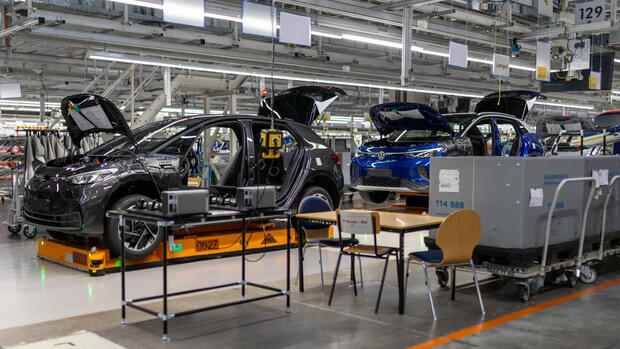Components from the ID series are also used in vehicles from the Indian manufacturer Mahindra.
(Photo: IMAGO/Kirchner Media)
Dusseldorf Volkswagen is intensifying its cooperation with the Indian car manufacturer Mahindra. In the UK, the companies signed a deal that will see Volkswagen supply electric components to Mahindra’s new SUV range.
These include the electric drive train, the battery system and the standard battery cell that are used in Volkswagen’s current MEB series. The vehicles in the series include the fully electric ID models.
The binding supply agreement is to be finalized by the end of 2022. The first components are to be delivered from 2024. The companies did not provide any information on the terms of the contract.
According to a joint statement, the aim is to achieve a volume of more than one million units over the course of a vehicle generation and to supply five electric SUV models with MEB components.
Top jobs of the day
Find the best jobs now and
be notified by email.
Volkswagen and Mahindra had already contractually agreed in May to examine cooperation in the supply of MEB components. In addition to the Indian group, the US car manufacturer Ford also relies on components from the MEB series.
Thomas Schmall, CTO at Volkswagen and head of the components department, sees great opportunities in the Indian market: “Together, Volkswagen and Mahindra can make a significant contribution to the electrification of India, a huge automotive market with ambitious climate protection goals.”
At the moment, it doesn’t look as if electrification in India will make much progress. But according to Schmall, the government is pursuing an aggressive expansion plan. According to forecasts, around four million vehicles will be registered in India every year from 2030, around half of which will be purely electric.
The cooperation between Volkswagen and Mahindra could be further expanded. In the long term, the companies are considering locating cell production in India. According to Schmall, there would have to be a requirement of at least 20 gigawatt hours for such a cell plant to be economically worthwhile.
Heavy dependence on China
To date, around three million new vehicles have been sold in India every year. This makes the subcontinent one of the five largest car markets in the world. In a globally declining passenger car sales market, new registrations only increased there and in China in the first half of 2022.
But despite this development and the large number of inhabitants, the Indian market has so far only been a hope for the automotive industry. In contrast to China, where German car manufacturers in particular generate large parts of their annual sales, India does not yet play a role.
However, following the Russian invasion of Ukraine, the political tensions between the USA and China and the human rights violations in Xinjiang, China, the strong China commitments of Volkswagen, Mercedes and BMW have come under criticism and harbor long-term economic risks.
In the long term, car manufacturers are dependent on expanding their sales in other markets. VW, for example, continues to try the US market, which has not yet been exhausted. The increased involvement in India is likely to be part of the strategic considerations to reduce dependence on China, especially in the Asian market. So far, there has been no alternative to the People’s Republic: Volkswagen sells around 40 percent of the vehicles it produces worldwide there.
More: Volkswagen suddenly gets more chips again – “tailwind for the new CEO”
